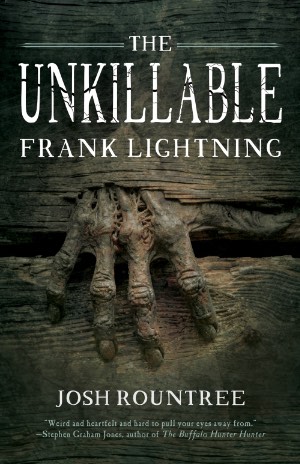
The Unkillable Frank Lightning
Resurrection and horror fiction have a long history. It’s hard to keep a good theme buried. The longevity of Frankenstein along with certain writings of Poe, and subsequent famous resuscitations of “The Monkey’s Paw” such as Pet Sematary, demonstrate that bringing back the dead is in an everlasting state of revival. The Unkillable Frank Lightning by Josh Rountree is a hybrid riff on the Universal Studios movie interpretation of Mary Shelley’s Frankenstein. Like Rountree’s previous novel, The Legend of Charlie Fish, which was based on Universal’s Creature from the Black Lagoon, the narrative uses the Old West as a partial backdrop. The reckless violence of the locale and era works quite well atmospherically for a tale of gore and horror. Yet that is not what makes The Unkillable Frank Lighting an absorbing read. What renders it profoundly engaging are its quirky yet accessible characters, and a compelling story that masterfully straddles genres.

Leading the cast of characters is Catherine Coldbridge who, in 1879, is conspicuous for being a female medical doctor. She is also an adroit closet practitioner of Magick. Soon after she marries, her husband Frank Humble is killed by Sioux Indians in a massacre. Catherine cannot accept his death and uses her arcane knowledge to bring him back to life. Her justification is poignant: “Grief creates a miasma of frantic thoughts and poor choices. Grief abandons us to our basest instincts. And while my conscious mind understood, even in that moment, what a burden my actions might put on my soul, I gave no thought to abandoning my course. No thought of facing my misery and allowing it to speak an end to the life I believed I deserved.” As one would expect, revival was not the best of options.
Approximately 25 years later, Catherine is determined to rectify the error in judgment. Her odyssey takes her from Montana, where she and Frank had lived together, to various Texas locations where she has tracked Frank. He has become a member of a travelling Wild West show, in which he is billed as “The Unkillable Frank Lightning.” Catherine attends a show: “The crowd cheered as the Unkillable Frank Lightning strode across the arena. He moved like a great lumbering bear, slow as sunrise but just as inevitable. He kept waving his hat in the air, revealing the angry scars on his head, evidence of where he’d been scalped, and where I’d pieced him together again. Those same scars ran down behind his ears and across his throat, and though he was covered entirely in buckskins, I knew the scars drew a roadmap across his chest, his back, his arms, and every part of him. His skin was the palest green, evidence of the corrupting influence of death that had not entirely left him. Frank managed a smile with his piecemeal face, and terror chased up my spine. Last time I’d seen that face, it had been covered in blood and howling like a hurricane.” Since the narrative fluctuates between Catherine’s 1879 intervention in Frank’s death and the period a quarter of a century later, when she seeks him out, the reader is given different takes on Catherine’s state of mind and what has happened in the intervening years.
Frank’s apparent adjustment to his condition, in tandem with his conspicuous mellowed temperament, leads Catherine to question the impetus of her quest. This vacillation does not set well with the two gunmen she’s employed to aid her in Frank’s permanent demise. The killers-for-hire are brothers with very different personas, although both have an irreverent sense of humor. That is a quality that sardonic Catherine generally appreciates — although not always: “The situation was escaping my control. The sight of my hired killer, seated on the sagging mattress, making jokes at my expense to my dead husband was too surreal for me to contemplate long.”
The brother assassins, the members of the Wild West show who have grown fond of Frank, and other characters who have memorable cameos in the narrative, infuse the story with color and conviction. At times downright funny, The Unkillable Frank Lightning, published by Tachyon, has an indestructible heart and a soul. It is convincing in the notion that resurrection can be synonymous with metamorphosis. In the case of Catherine, there’s an epiphany. She ultimately acknowledges that her pride, in achieving skills uncommon for her gender and time, strongly contributed to her rationale for resurrecting Frank: “I was operating from a place of hubris and not entirely one of love.” The novel ends in 1923 Chicago, with elderly Catherine reflecting on the mysteries of life and death. It was hard to leave her and many of the other inhabitants of the novel behind, but there’s a promise of seeing some of them again in Josh Rountree’s enthusiastically awaited next horror-western hybrid.

